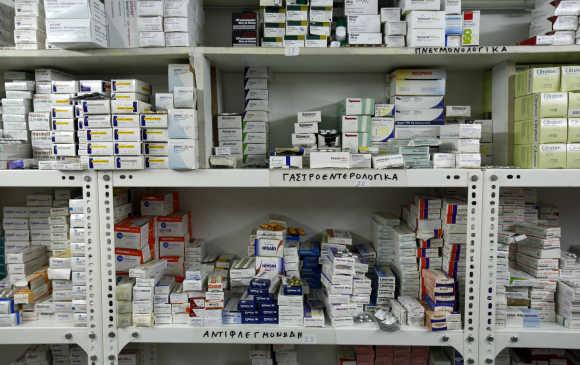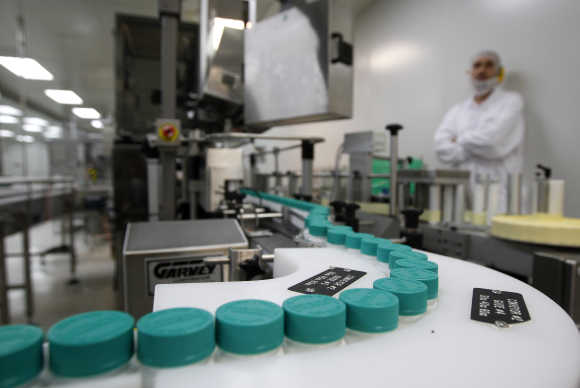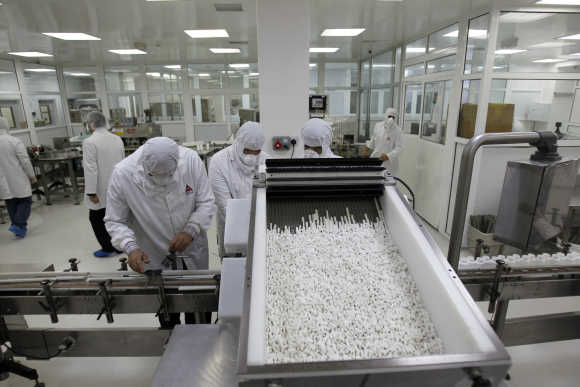Photographs: Yorgos Karahalis/Reuters Subir Roy
A decade ago India was the new kid on the block in clinical trials, a part of the contract research space. The Indian advantage lay in low-cost skills and patient diversity - the poor as well as the rich, with lifestyle diseases.
Ashish Dasgupta, an industry veteran then with Lambda Therapeutic, a contract research organisation, had said, "Indian CROs can be very competitive but must not be complacent. The global market has a lot of expectation from India." (Made in India, 2005, by this writer.)
...
Why clinical trials have gone haywire in India
Photographs: Yorgos Karahalis/Reuters
Some of that expectation has been belied. The clinical trial industry has been through hell in the last few months, prompting Dasgupta, now vice-chairman of the Association of Contract Research Organisations in India, to say, "irregularities should teach stakeholders how to tighten regulations and bring about better compliance... People have instead tarnished the industry's image."
The subject has become emotive and controversial, taking on the attributes of a scandal, with a sharp rise in the number of deaths among subjects participating in clinical trials revealed by the government in Parliament, NGOs moving the courts on the matter through public interest litigation and Supreme Court judges issuing obiter dicta reflective of the public mood built up ahead of pronouncement of actual judicial verdict.
...
Why clinical trials have gone haywire in India
Photographs: John Kolesidis/Reuters
Last August Health Minister Ghulam Nabi Azad told Parliament that 1,725 deaths had taken place in India among subjects participating in clinical trials over a four-year period (2007-10), with the figure going up sharply from 132 in 2007 to 668 in 2010.
However, there was a fall in deaths in 2011 to 438 which has been attributed to a slowdown in new trials launched to 169 in 2011 from 254 in 2010, as reported by the Financial Express.
In March this year the Supreme Court took on board a public interest litigation filed by a group of doctors alleging that illegal and unethical clinical trials were being conducted in Indore by multinationals on vulnerable members of society, resulting in deaths, and asked the government and the Medical Council of India to file their responses in six weeks.
...
Why clinical trials have gone haywire in India
Photographs: Ronen Zvulun/Reuters
Earlier this month, when the matter came up again before the court its mood had hardened as the Centre and the Madhya Pradesh government had not come up with their responses.
The court said: "There has to be some sense of responsibility. Human beings are being treated as guinea pigs. This is unfortunate."
As it happens, a large number of deaths have taken place among subjects of clinical trials conducted on behalf of several MNCs and leading Indian firms like Novartis, Quintiles, Pfizer, Sun Pharma and Jubilant, as reported by Business Standard.
...
Why clinical trials have gone haywire in India
Photographs: Jacky Chen/Reuters
Quintiles, a global leader in contract research, has emphasised that those participating in clinical trials are already afflicted and so death during trials need not be caused by the trials.
That is indisputable - but there is dark irony in Quintiles having to defend itself when it pioneered clinical trials in India in 1997 and had then rooted for India by asserting, "Doing work here is globally competitive, emphatically so," again in Made in India.
But there is another side to the deaths. The Tribune quotes Chandra Gulhati, who it says has led several clinical trials in the UK and is now investigating deaths which have occurred in Indore, as saying that the number of deaths will be much more than we will ever know.
...
Why clinical trials have gone haywire in India
Photographs: Ali Jarekji/Reuters
There is no independent audit to investigate the cause of death and the regulator simply takes the word of the investigator if it says that a death took place owing to prior illness.
Such investigators are hired by the firm seeking to test its new entity, so "how can we expect them to be objective all the time?"
There is also the issue of how or where a trial is conducted. Apurva Shah, chairman of ACRO in India, has asserted that studies conducted in Indore, now the subject of court scrutiny, do not involve any major CRO.
...
Why clinical trials have gone haywire in India
Photographs: Mark Blinch/Reuters
This may be so, but Indian CROs have a history to live down. In 2004 there was a scandal of sorts when the World Health Organisation withdrew its approval of cheap anti-retroviral drugs - used in the global fight against AIDS - manufactured by some leading Indian drug companies because the bio-equivalence studies for them conducted by CROs in India were faulty.
This column had then observed, "It is tragic that the bad influence of poor domestic standards has blotted the Indian drug industry's copybook and severely set back the CRO industry. The redeeming feature is that there will now be a shakeout in the CRO industry."









article